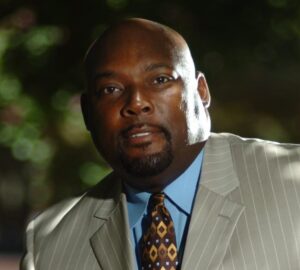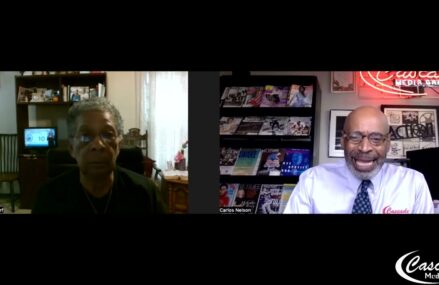
By B. Michael Long
If the lesser of two evils was ever on display, many who watched the presidential debate last night saw it in living color. All my critical thinkers know that last night’s masquerade was a glaring display of political theater, full of deception, manipulation and blatant insults to the intelligence of the American public. As millions of viewers tuned in, hoping to gain insight into the future direction of the country, they were instead treated to a spectacle that seemed more suited to reality television than serious, intellectual discourse. Donald Trump and Kamala Harris, representing two of the fifty-three ballot-qualified political parties in America, each took turns misrepresenting facts, distorting truths and engaging in the classic blame game, proving once again that the real power brokers behind the scenes continue to control the narrative.
Both candidates showcased their political mastery of half-truths and outright falsehoods. Donald Trump at one point claimed, “I have nothing to do — as you know and as she knows better than anyone — I have nothing to do with Project 2025. That’s out there, I haven’t read it. I don’t want to read it purposefully. I’m not going to read it.” Trump’s claim that he is unaware of Project 2025, a strategic blueprint for reshaping the federal government, is misleading given the involvement of more than several of his former cabinet members in its development. Despite Trump’s public denial, individuals like former Acting Director of the Office of Management and Budget Russ Vought and former EPA Administrator Andrew Wheeler have been key contributors to the project’s drafting process. This plan, backed by the Heritage Foundation, aims to radically alter the civil service by centralizing executive power and purging non-loyal bureaucrats, reflecting priorities consistent with Trump’s administration. His statement appears to distance himself from the project, possibly to avoid political backlash or scrutiny, while those closely aligned with him work behind the scenes to implement the very agenda he once championed.
Vice President Kamala Harris, on the other hand, stated that “there is not one member of the United States military who is in active duty in a combat zone, in any war zone around the world, the first time this century.” Her statement, to put it kindly, was simply misleading. The Pentagon continues to be involved in various military engagements globally, including proxy wars and direct interventions. While the Biden administration completed the withdrawal of troops from Afghanistan in 2021, U.S. forces remain actively deployed in several conflict zones, such as Syria and Iraq, where approximately 2,500 and 900 U.S. troops, respectively, continue operations against ISIS and other militant groups. Additionally, the U.S. military plays a significant role in supporting proxy forces in Yemen, Somalia and Ukraine, where it provides training, intelligence and logistical support. These operations clearly show that American military personnel are still engaged in combat zones or actively contributing to conflicts worldwide, contradicting Harris’s claim that no U.S. military members are currently in a war zone.
From my historical field of view, the entire debate felt like a carefully orchestrated charade, insulting the intelligence of those who were watching. This is, however, not a new phenomenon; the American people have been treated like spectators at a gladiatorial arena, where rhetoric and bravado replace meaningful policy discussion. Feeding the masses a palatable diet of bread and circuses to desensitize their mind, the candidates childishly argued back and forth. As the debate labored on, it became increasingly clear that the real issues – such as wealth inequality, systemic racism, miscarriages of justice, climate change and healthcare reform just to a name a few – were only being addressed superficially.
In fact, primaries, debates and federal elections have long been a performance piece; a charade designed to give the appearance of choice while keeping real power firmly in the hands of the elite. As Muammar Qaddafi wrote in The Green Book, “Representation is a fraud. The mere existence of a parliament means the absence of the people. True democracy exists only through the participation of the people in power, not through the choice of representatives.” This critique of representative democracy rings painfully true in the context of the debate, where the people are given a limited choice between two candidates pre-approved by the ruling elite, both beholden to corporate interests and donors.
The most glaring element of the debate, however, was the classic use of Hegelian Dialectics – a strategy where a problem is created, a reaction is garnered and a pre-determined solution is offered, often leading to more centralized control. Trump and Harris each played their part in the elite’s carefully choreographed performance. They were strategically positioned as oppositional forces, diametrically opposed in ideology, when in reality, both are pawns in a larger game.
The elite’s use of Hegelian Dialectics is a masterstroke of manipulation. By controlling both sides of the debate, they ensure that, regardless of who wins, their interests are protected. As the candidates engaged in mudslinging, exchanged soundbites and rehearsed their carefully prepared zingers, they obscured the fact that real policy decisions are being made behind closed doors, in boardrooms and private clubs which Main Street is on the out with.
By presenting the citizenry with only two choices – each supposedly embodying a radically different vision for the future – the two-party system reinforces the illusion of choice. Yet, as George Carlin once said, “It’s a big club, and you ain’t in it.” The reality is that both parties are controlled by the same elite handlers, who fund campaigns, shape public opinion through media control and ensure that any candidate who makes it to the national stage is compliant with their agenda.
As of last night’s debate, the American public was presented with yet another stark reminder that the American political system isn’t broken, nor is it about the will of the people, but about the elite maintaining control. Elections, as history has proven, are less about genuine policy choices and more about keeping the citizenry divided and distracted, engaged in petty squabbles rather than uniting against the real sources of power; the elite and their puppets.
After the debate, I watched a newsreel on NBC where three Pennsylvanians were asked for their perspectives about it. Their responses reflected a growing frustration and disillusionment among the people. One respondent summed up the event as the “same old, same old,” pointing to a weariness with the repetitive nature of political discourse that offers little in terms of fresh ideas or meaningful change. Another stated that the debate was “manipulative,” suggesting that it was more about controlling perceptions than offering truthful dialogue or real solutions. The third described the debate as “lies on both sides,” also suggesting a widespread belief that the candidates were more focused on deceptive and deflective tactics rather than on giving honest answers or proposing genuine solutions. Together, these comments reveal a public increasingly skeptical of the political process, fed up with theatrics, and craving authenticity and transparency from their leaders.
If there ever was a time for the American people to see what the rest of the world has been seeing on our political landscape, last night was it. As an individual who was made aware of the farce of federal elections during the first Dubya administration, last night’s debate in my eyes highlighted not the differences between the candidates, but their sameness; their willingness to serve their elite masters, to bend to corporate interests and to continue the charade of democracy.
I strongly suggest that understanding the Hegelian Dialectic is key to recognizing how the two-party system is designed to divide, distract and conquer. Until we address the root of the problem – a political system that is owned, rigged and controlled by elite handlers – real change will remain elusive. In my humble opinion, the debate was not about finding solutions to America’s problems, it was about ensuring that the status quo remains firmly in place.
My question for the people is this: will we continue to play along with the puppet masters and their puppet theater, or will we demand a stage where real voices, not puppets, are heard?
The choice is ours.
All power to the people!


